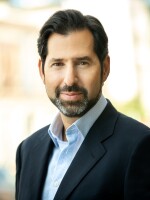An FCC analysis compiled two years ago showed that locally owned television stations provide significantly more local news. But the report was never made public, an omission that is raising questions.
Major media companies want the Federal Communications Commission to ease or erase restrictions on how many television stations they can own. Under its two most recent chairmen, the FCC has sought to do just that.
FCC researchers Keith Brown and Peter Alexander looked into whether the ownership structure of a TV station really affected the local news coverage it gave to viewers.
After painstaking analysis, the researchers determined that locally owned news stations provided more than five-and-a-half minutes more of local news for each half-hour newscast.
The FCC's rulings on media ownership will affect such big national companies as Tribune, which hopes to hold onto major newspapers and television stations in the same markets. That ambition is largely barred under current rules. Other major companies, such as News Corp. and Sinclair Broadcast Group, have stretched FCC regulations as they've expanded their television holdings. They each own several dozen stations across the country.
Alexander and Brown based their research on the work of University of Delaware professor Danilo Yanich, who created a database of thousands of local TV news stories from 20 U.S. media markets. Yanich says the study deserved widespread attention as policy changes were considered.
"It was an extremely well done piece of research and it should have been used as it was supposed to have been used -- to inform policy," Yanich says.
But back in the summer of 2004, according to Yanich and FCC lawyer Adam Candeub, FCC bosses stopped the local news study cold. Staffers were told to destroy or return any copies they had of it.
So the report was never released -- until this week, following Senate hearings on President Bush's renomination of FCC Chairman Kevin Martin. Sen. Barbara Boxer (D-CA) surprised Martin as she questioned him on media consolidation. Boxer said someone had sent her the report anonymously.
Martin wrote to Boxer Thursday, saying he knew nothing about the document. In an interview with NPR, his predecessor as chairman, Michael Powell, also denied any knowledge of the report.
"Never saw it, never ordered it be stifled in any way," Powell says. "So any suggestion that senior levels of the commission spike that report, at least from my vantage point, didn't happen."
Powell had pushed to make it tougher for companies to own more radio stations in the same market, but he was also seeking to ease regulations limiting how many local TV stations a company could own. Powell says he would have been happy to review the study, had he known of it -- along with other studies that, he says, show corporate owners offer more local coverage.
Former FCC lawyer Candeub is now a law professor at Michigan State University. He says the FCC's response shows its leaders had already made up their minds.
Candeub says, "It seems like the agency can be so craven that they want to sort of generate this alternate reality that's consistent with what the commissioners want to see."
Boxer is now calling for an inspector general to investigate the episode.
Copyright 2022 NPR. To see more, visit https://www.npr.org. 9(MDAzMjM2NDYzMDEyMzc1Njk5NjAxNzY3OQ001))






